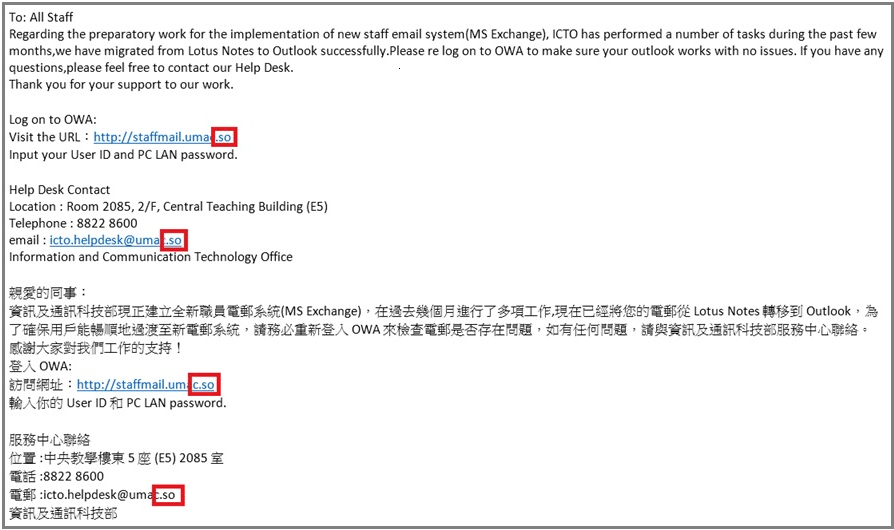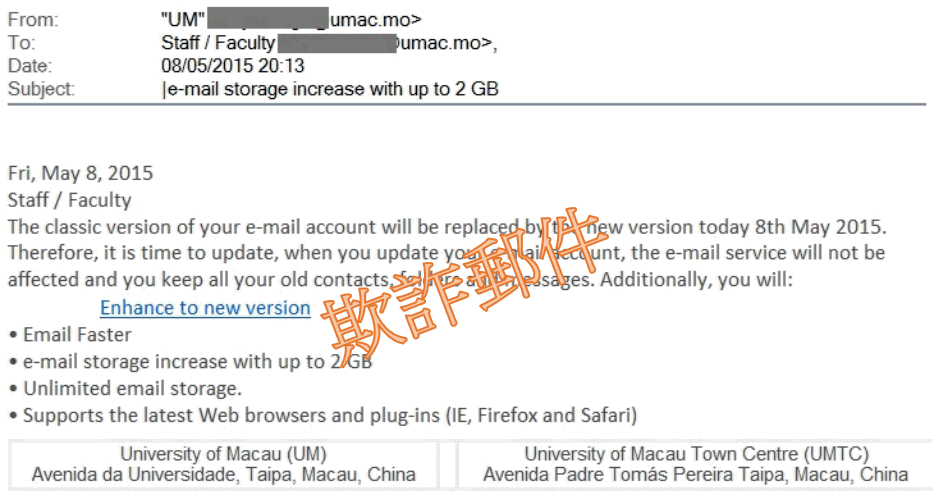VeraCrypt – TrueCrypt 的替代加密軟件
/在: 資訊安全通告 /通過: patrickchiu Chiu Chi Chong正如較早前發佈,TrueCrypt 可能含有未修復的安全問題。
目前,已有幾種開源軟件可替代 TrueCrypt,其中之一是加密軟件 VeraCrypt。它提供一個全面的安全問題解決方案。此軟體不僅能夠解決許多 TrueCrypt 中的漏洞和安全問題,而且它還適用於 Windows 、Mac 和 Linux 系統。
VeraCrypt 支援高度安全的 AES 和 Serpent 、Twofish 三種加密演算法以及它們的組合來加密數據。用戶可以使用它來創建加密區或加密磁碟分區和整個磁碟。
資訊及通訊科技部網頁上有提供 Windows 和 Mac 作業系統內建加密工具的使用教學,詳情請參閱: http://www.umac.mo/icto/intranet/security/encrypt_veracrypt_c.html
如有任何疑問,請與我們的服務中心聯絡:
服 務 中 心
位置 : 中央教學樓東5座(E5)2085室 (電子地圖)
電話 : 8822 8600
電郵 : @
資訊及通訊科技部
Please Do Not Respond to Phishing Email (24-Feb-2015)
/在: 資訊安全通告 /通過: patrickchiu Chiu Chi ChongDear Users,
You may have received email similar to the above phishing email, which seems to be sent by ICTO.
Please DO NOT RESPOND to this kind of emails which purposely asking for your user name and password. ICTO will NOT ask you for these information through email or web page. If you have responded to the suspicious email accidentally, you are advised to reset your password at once.
If you have any further queries, please feel free to contact our Help Desk (Ext. 8600, Email: @)
Thanks for your attention.
Information and Communication Technology Office
Be aware of the email with suspicious attachment named “A letter of complaint on University of Macau.rar”
/在: 資訊安全通告 /通過: patrickchiu Chiu Chi ChongTo: All Users
Many users reported that they received a suspicious email with password protected attachment named “A letter of complaint on University of Macau.rar”. Please DO NOT OPEN this attachment. This attachment contains a suspected Trojan. Usually, to compress an attachment with password can be used to bypass Anti-virus system. If you open it, your computer may be infected.
If you have any further queries, please feel free to contact our Help Desk (Ext. 8600, Email: @)
Thank your your attention.
Information and Communication Technology Office
Please Do Not Respond to Phishing Email (31-Mar-2015)
/在: 資訊安全通告 /通過: patrickchiu Chiu Chi ChongDear Users,
You may have received email similar to the above phishing email, which seems to be sent by ICTO.
Please DO NOT RESPOND to this kind of emails which purposely asking for your user name and password. ICTO will NOT ask you for these information through email or web page. If you have responded to the suspicious email accidentally, you are advised to reset your password at once.
If you have any further queries, please feel free to contact our Help Desk (Ext. 8600, Email: @)
Thanks for your attention.
Information and Communication Technology Office
Critical Security Notice for OpenSSL Heartbleed Vulnerability
/在: 資訊安全通告 /通過: patrickchiu Chiu Chi ChongTo All Users,
The US Computer Emergency Readiness Team (US-CERT) have issued warnings on the vulnerability that found in OpenSSL versions 1.0.1 through 1.0.1f, and version 1.0.2-beta including version 1.0.2-beta1.
Original release date
8 April 2014
Description
This vulnerability allows remote hackers to retrieve sensitive information without authentication through incorrect memory handling in the TLS heartbeat extension. User authentication credentials and secret keys may then be disclosed to hackers.
The sensitive information that may be retrieved using this vulnerability include:
- Primary key material (secret keys)
- Secondary key material (user names and passwords used by vulnerable services)
- Protected content (sensitive data used by vulnerable services)
- Collateral (memory addresses and content that can be leveraged to bypass exploit mitigations)
Systems Affected
- OpenSSL 1.0.1 through 1.0.1f
- OpenSSL 1.0.2-beta (including 1.0.2-beta1)
Solution
Step 1: You can check if your web server is affected by this vulnerability through https://www.ssllabs.com/ssltest/. A warning as show below will be displayed if the webserver is affected:
![]()
Step 2: OpenSSL has released the latest patches to address this vulnerability, you can download the patched update fromhttps://www.openssl.org/source/.
- For OpenSSL version 1.0.1 (including 1.0.1f): Update to version 1.0.1g
- For OpenSSL version 1.0.2-beta (including 1.0.2-beta1) : To be fixed in version 1.0.2-beta2. Users unable to immediately upgrade can alternatively recompile OpenSSL with -DOPENSSL_NO_HEARTBEATS .
- Details: https://www.openssl.org/news/secadv/20140407.txt
Step 3: Any keys generated with a vulnerable version of OpenSSL should be considered compromised, they should be regenerated and deployed after the patch has been applied.
References
Thank you for your attention. For further inquiries, please feel free to contact our Help Desk (Ext. 8600, Email: @).
Information and Communication Technology Office
Important System Security Update for Shellshock
/在: 資訊安全通告 /通過: patrickchiu Chiu Chi ChongTo All Users,
Please be informed that a high security vulnerability in UNIX Bash shell (Shellshock, also known as Bashdoor) was
disclosed on 24 Sept. 2014, which would eventually let remote attackers bypass system authentication and execute
arbitrary commands.
Affected systems:
– CentOS
– Mac OS
– Redhat Enterprise Linux
– Ubuntu
– And any systems which utilize BASH as the default system shell
System administrators and users of UNIX / Linux / Mac are advised to update the BASH of their system to the latest available version.
For CentOS, Redhat Enterprise Linux users, detailed update information can be found:
https://access.redhat.com/articles/1200223
Mac OS
For Mavericks 10.9.5 – http://support.apple.com/kb/DL1769
For Mountain Lion – http://support.apple.com/kb/DL1768
For Lion – http://support.apple.com/kb/DL1767
Ubuntu
http://www.ubuntu.com/usn/usn-2363-1/
http://www.ubuntu.com/usn/usn-2364-1/
More general information can be found here
CVE-2014-6271 – http://web.nvd.nist.gov/view/vuln/detail?vulnId=CVE-2014-6271
CVE-2014-6277 – http://web.nvd.nist.gov/view/vuln/detail?vulnId=CVE-2014-6277
CVE-2014-7169 – http://web.nvd.nist.gov/view/vuln/detail?vulnId=CVE-2014-7169
CVE-2014-7186 – http://web.nvd.nist.gov/view/vuln/detail?vulnId=CVE-2014-7186
CVE-2014-7187 – http://web.nvd.nist.gov/view/vuln/detail?vulnId=CVE-2014-7187
Thank you for your attention. For further inquiries, please feel free to contact our Help Desk (Ext. 8600, Email: @).
Information and Communication Technology Office




